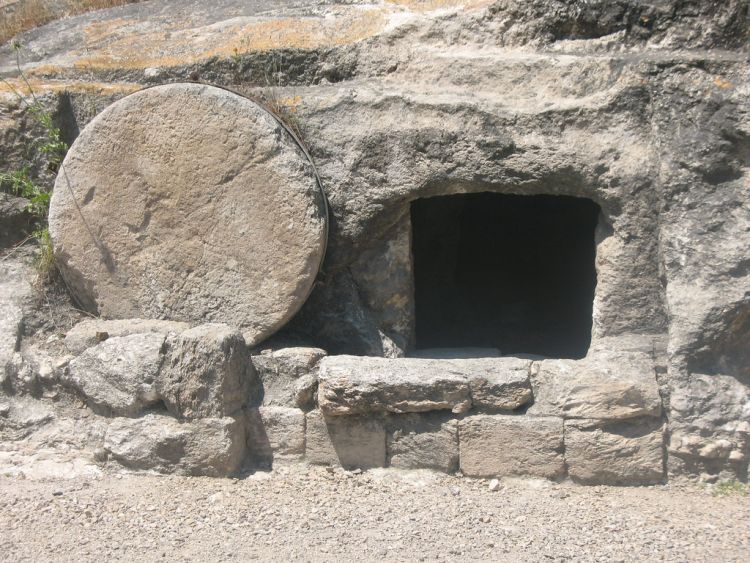Jesus’ disciples were not at their best at the end of his life. They were fearful, uneasy, and uncertain about the future.
And yet, at the end of the Gospels, these same men were ready to take on the world. How can we explain this difference?
The Disciples Before
For most of the last chapter of Luke, the disciples were not exactly full of faith.
When the women who visited the tomb told the apostles what they had seen, the men did not believe them—it sounded like an “idle tale” (Luke 24:11). Peter was curious, but he didn’t have much company when searched out the evidence (Luke 24:12, John 20:8).
The two disciples on the road to Emmaeus were intrigued by the women’s report (Luke 24:22), but they had lost hope in Jesus as the Redeemer of Israel (Luke 24:21). His death was unexpected and disheartening.
When Jesus appeared to his disciples, they thought he was a spirit (Luke 24:37). They were full of fears and doubts (Luke 24:38). Even after Jesus showed them his hands and feet and invited them to touch his wounds, they weren’t convinced it was him (Luke 24:41).
The Disciples After
The end of Luke 24 stands in stark contrast to its beginning.
The disciples witnessed Jesus’ ascension, worshiped him, and returned to Jerusalem with great joy (Luke 24:51–52). They were continually in the temple praising God (Luke 24:53).
The fact that the disciples returned to Jerusalem with great joy is itself an act of faith. In Luke, Jesus spent the first part of his ministry teaching and healing in Galilee, but then “he set his face to go to Jerusalem” (Luke 9:51).
Things unraveled quickly after Jesus and his companions arrived in Jerusalem for Passover. Jesus was betrayed, arrested, tried, and killed. The religious and governmental leaders who were responsible were largely still present in Jerusalem on Easter Sunday; this would have made the city a terrifying place for Jesus’ followers.
Yet Jerusalem was to be the launching place for the proclamation of the gospel to all the nations (Luke 24:47). Jesus told his disciples to stay in the city until they received power for this mission (Luke 24:49). The fact that they faced staying in a dangerous place with “great joy” shows the magnitude of their transformation.
So, what caused the change?
The Elements of Change
As we observe the text of Luke 24, we notice three ingredients that kindled the disciples’ growth.
The Word of God
Jesus’ followers did not understand the Scriptures. Consequently, they did not grasp who he was nor did they expect him to suffer, die, and rise.
At the tomb, the angels reminded the women that Jesus had told them that he “must” die and rise (Luke 24:6–8).
Jesus told the Emmaeus-bound disciples that they were foolish and slow to believe what the prophets had spoken (Luke 24:25). He explained that it was “necessary” for the Christ to die and then enter glory (Luke 24:26). He then taught them about himself through all the Scriptures (Luke 24:27).
When Jesus appeared to the disciples, he reminded them that everything in the Law, Prophets, and Psalms “must” be fulfilled (Luke 24:44). He opened their minds to understand the Scriptures (Luke 24:45).
God’s word is the central corrective element in this passage. Jesus, the angels, and Luke all point to the Scriptures for a proper understanding about the Messiah. That understanding brought transformation.
Jesus
The disciples heard rumors of Jesus’ resurrection, but they were changed when they finally saw him.
After the two traveling disciples recognized Jesus at a meal, they felt conviction like heartburn when they reflected on his Scripture lesson for them (Luke 24:32). They returned to the eleven with the ground-breaking news (Luke 24:33), and when they arrived, the others were convinced of the resurrection because Jesus had also appeared to Peter (Luke 24:34).
When Jesus “stood among” the disciples, they weren’t convinced it was him (Luke 24:36–37). But Jesus invited them to touch and see. He showed them his hands and feet. He ate with them (Luke 24:39–43). Thus convincing the disciples that he was not a spirit and that he was, in fact, Jesus, he gave them supernatural understanding of the Scriptures (Luke 24:45).
Finally, the disciples went with Jesus to Bethany for his ascension (Luke 24:50). He blessed them as they watched him depart (Luke 24:51).
The disciples had experienced a traumatic stretch of days. At the center of their disappointment was the death of their leader and their loss of hope. Spending time with and learning from Jesus between his resurrection and ascension had a powerful effect.
A Mission and a Promise
When Jesus visited the disciples, he didn’t only give them instruction and fellowship, he gave them a purpose for the future.
When explaining the Scriptures, Jesus said “it is written” that “repentance for the forgiveness of sins should be proclaimed in his name to all nations, beginning from Jerusalem” (Luke 24:47). And the disciples were not just messengers but “witnesses of these things” (Luke 24:48).
Jesus gave the disciples a promise to accompany their mission.
And behold, I am sending the promise of my Father upon you. But stay in the city until you are clothed with power from on high. (Luke 24:49)
The disciples had a great task in front of them, but there was a mighty helper on the way.
Main Point and Application
Luke had at least one main point in writing the last chapter of his Gospel: An encounter with the resurrected Jesus will transform disciples and prepare them for a joyful mission.
We can start to apply this powerful truth by praying. Let’s pray for these encounters—for ourselves and others.
And as you brainstorm ways to bring yourself and your neighbors into contact with the risen Christ, remember that he is powerfully present in the Bible and with his people.
Post credit | Picture credit


